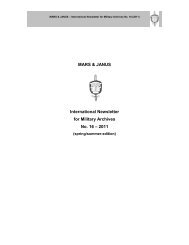National Experiences - British Commission for Military History
National Experiences - British Commission for Military History
National Experiences - British Commission for Military History
You also want an ePaper? Increase the reach of your titles
YUMPU automatically turns print PDFs into web optimized ePapers that Google loves.
do C t r i n e, Ca pa C i t i e s, te C H n o l o g y a n d o p e r at i o n a l en v i r o n m e n t o n t H e em p l o y m e n t o f t H e air po w e r ; t H e Ca s e o f guerrilla wa r fa r e 247<br />
<strong>for</strong>cing enemy to the camouflage that was never fully effective, <strong>for</strong> the inherent<br />
offensive capacity, and <strong>for</strong> the possibility of supporting populations in various domains.<br />
In the war against guerrillas there is room <strong>for</strong> difference between joint operation<br />
and support operation, in that in the first one setting goals and conception of the<br />
manoeuvre are established by the participant <strong>for</strong>ces exploring synergies resulting<br />
from the capabilities of each type of <strong>for</strong>ce. The support operation responds to precise<br />
requests issued by the supported units, but <strong>for</strong> this type of operation it becomes<br />
mandatory to establish per<strong>for</strong>mance standards that allow a better understanding of<br />
the capabilities and vulnerabilities of the air means, which results in the maximized<br />
exploration of the capabilities of the <strong>for</strong>ce to be in support. This difference was very<br />
important in certain conditions, despite the difficulty to be managed seamlessly.<br />
The execution of air operations in counter guerrilla warfare placed some specific<br />
problems that can be easily overcome in our days, but there were real problems in<br />
the past. For instance, in addition to its own problems of navigation, it could be as<br />
difficult to detect enemy targets as well as the friendly <strong>for</strong>ces that could be very close<br />
– with the technology available at the time this was a very difficult problem to solve,<br />
although this difficulty did not conduct to situations of fratricide fire. There were no<br />
available guided weapons, but its inexistence did not substantially affect the results<br />
of operations, given the nature of the targets, the level of training of most of the crew<br />
with very good CEP (Circular Error Probable), and the air supremacy that allowed<br />
some stability in the execution of the attack.<br />
In counter-guerrilla warfare there is no need <strong>for</strong> very sophisticated means of combat<br />
but it is decisive to know how to exploit the potential of such resources in face<br />
of the needs of the mission.<br />
In the Portuguese case, in the fight between the aircraft and the anti-aircraft<br />
weapons, the aircraft survived by adopting the appropriate tactics and reacting hard<br />
against the ground attackers when detected. It is said, frequently, that it was the appearance<br />
of the Strella missile that made the war end sooner. In our point of view,<br />
this analysis lacks fundaments although it is true that the shooting of several aircraft<br />
in a very short period of time produced a very negative psychological effect, by<br />
surprise, but this did not prevent the reaction to occur which lowered drastically the<br />
initial results.<br />
In every theatre the Air Force, in addition to participating in joint and support<br />
operations, acted independently in planning and implementation of many actions,<br />
such as was the case with systematic aerial reconnaissance in exploration of the intelligence<br />
reports, or the selective attack on the enemy positions which constituted<br />
as targets of opportunity, or in areas where it was not easy to access by land. In all<br />
theatres areas of free intervention of the Air Force were marked, where it was not<br />
required prior coordination to per<strong>for</strong>m operations in accordance with high rank directives<br />
of war strategy.



